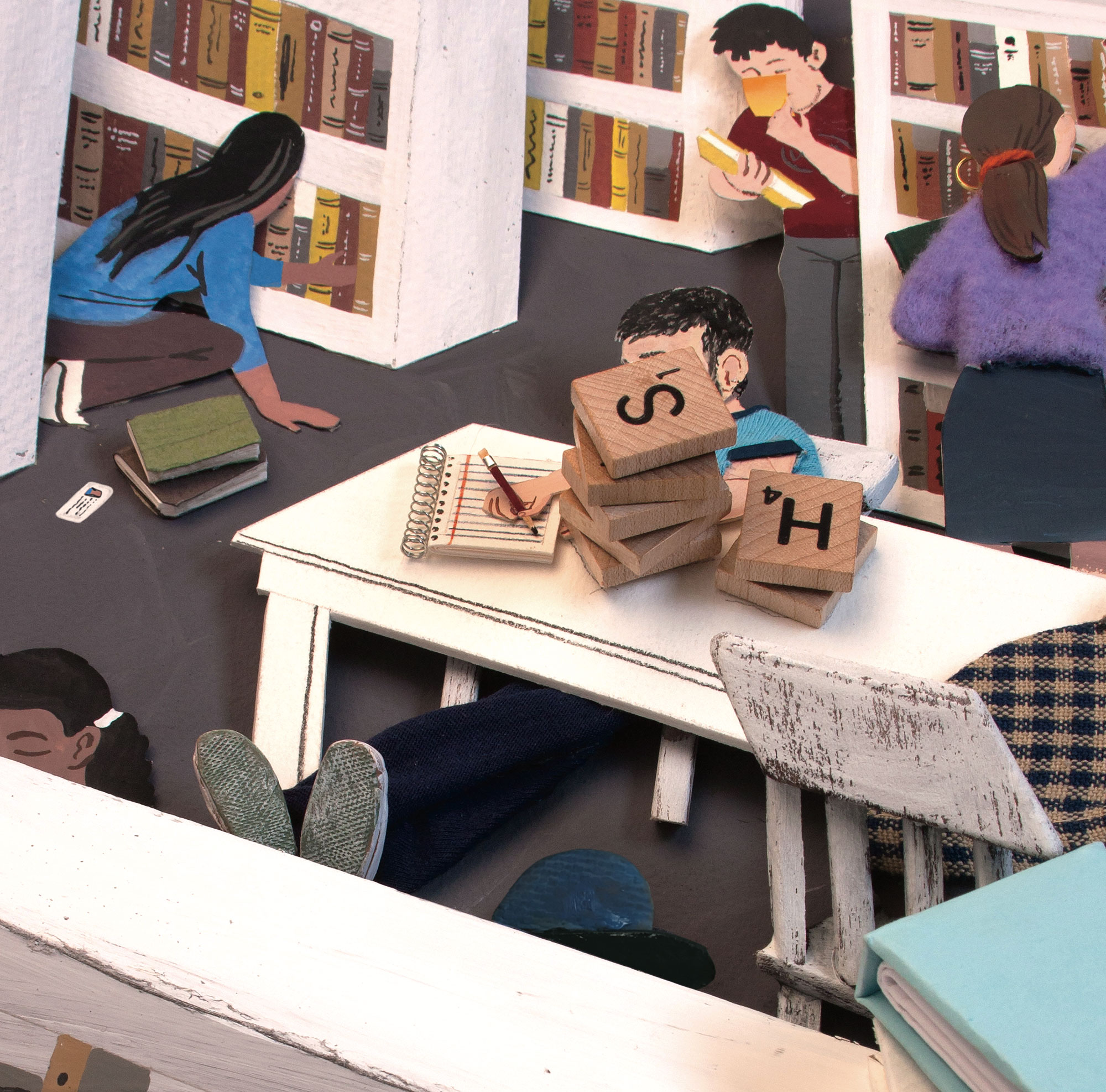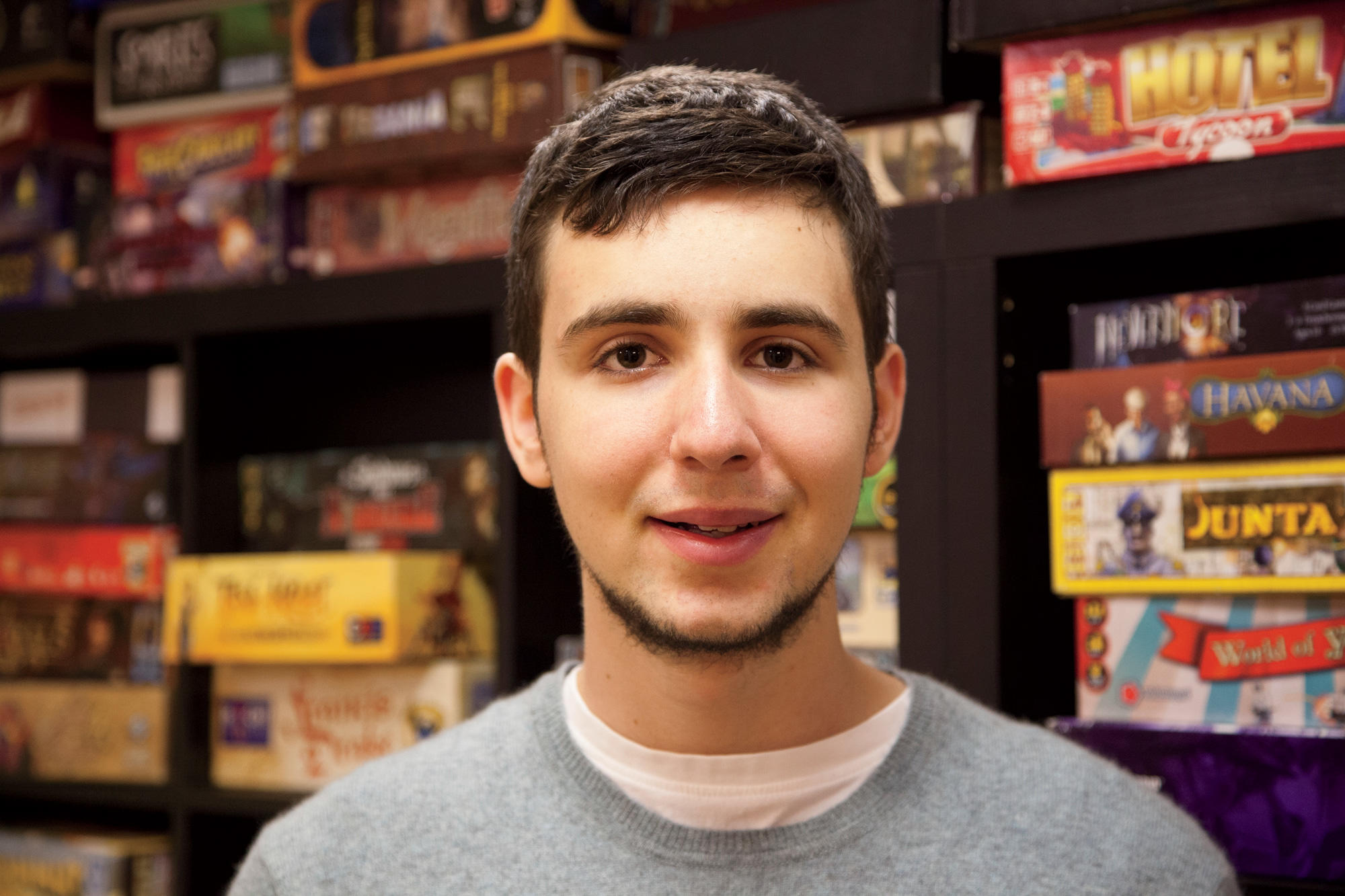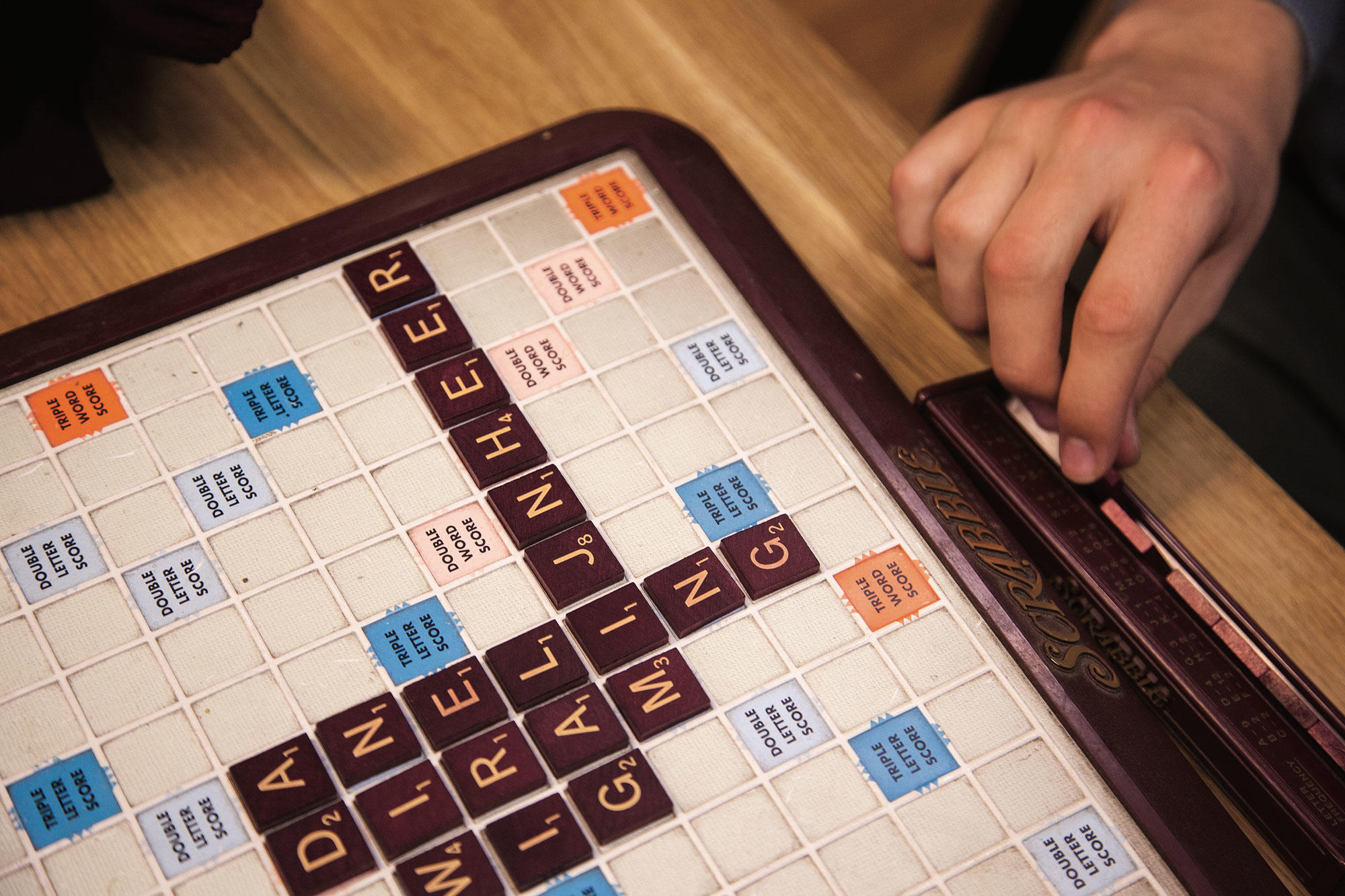
In 2011, Mack Meller went to Stamford, Connecticut, for a Scrabble tournament. In the first round, as he was settling in, the tournament director interrupted play for an announcement. This was highly irregular. But the news warranted it: Joel Sherman, a forty-nine-year-old former world champion from the Bronx, had just finished a game with 803 points — a new world record in tournament play and the first time a tournament player had ever broken 800.
Meller and his opponent, having stopped their clocks (in tournament Scrabble each player is allotted twenty-five minutes to make all of his or her plays), placed their tiles face down and walked over to Sherman’s board. So did lots of other players. Meller couldn’t believe it. Eight hundred! That was Scrabble’s holy grail. Sherman had used all seven of his letters — called a “bingo” and good for fifty extra points — seven times.
It was a feat for the ages, but Sherman didn’t win the tournament. Meller did. He was eleven years old.
It’s Thursday night, and Meller, now a lanky, sociable seventeen-year-old Columbia first-year, leaves his room in Furnald Hall and heads for the subway. He carries his Scrabble traveling bag, which contains a round board, a chess clock, and a drawstring sack filled with exactly one hundred yellow plastic tiles. He gets out in Midtown and walks to a fifteen-story building at Lexington and East 58th, where, in a room on the twelfth floor, the Manhattan Scrabble Club holds its weekly rodeo.
“One of the great things about being at Columbia, aside from the outstanding academics and a diverse peer group, is the proximity to the club,” says Meller, who is the top-rated under-eighteen Scrabble player in North America, a distinction he has held since age twelve. “You get to play against some of the best players in the world.”
The Scrabble room is located inside the Honors Bridge Club. It has beige walls, waiting-room art, fluorescent lights. About twenty Scrabble players, women and men, sit at blond wooden tables, hunched over boards. There is an out-of-time quality to the scene, faint flavors of a bygone canasta night at Grossinger’s or the Concord. Meller, bright-eyed, mild-mannered, palpably well-adjusted, strikes the room’s most contemporary note. You might never guess that in this den of hardened, seen-it-all Scrabblers, Meller, not yet of voting age, is the deadliest.
Meller first stepped foot in the club at age ten. His parents drove him to the city from Bedford in Westchester County, where he grew up. That year, he played in his first tournament — and lost the first game. “I was demoralized and very rattled,” Meller says. “I had to really stay focused to claw my way back.” He nailed seven straight victories and won the tournament. “Even more valuable than winning was having to come back from losing the first game,” Meller says. “Whether it’s through making a mistake or just poor luck, you’re going to have bad games. You can’t dwell on it or you’ll continue to go south.”
Though Meller prefers live competition and the touch of the tiles under his fingertips, he has played untold hours of virtual Scrabble, either online against humans or against Quackle, the Deep Blue of Scrabble software. His own mind is computer-like: of the 120,000 words in the Scrabble lexicon, some 90 percent are filed between Meller’s ears. Lately, he’s been studying nine-letter words (requiring letters already on the board), a rarity in Scrabble and “not the most productive use of my time,” Meller admits. “But I love the long words, and when I do get to play them it’s really rewarding.”
At seven o’clock, the club’s director, Joel Sherman — the Joel Sherman, thin and spectral, Poe-like in aspect — calls out the first matchups. Meller will play Debbie Stegman ’85BUS.
Stegman, a former vice president of human resources at Time Warner, has been ranked as high as forty-second in the country. She grew up on Long Island playing Scrabble with her mother and grandmother. “One big rule in our family, for any games, was that you don’t let the kid win,” she says. “So I would lose 310–112. But I knew that the first time that I won, I really won. And it was awesome.” She began playing in tournaments in 2000 — the year Meller was born — and reached her peak rating while between jobs (“Unemployment does wonders for your Scrabble game”).
She remembers Meller’s precocious debut at the club. “Mack never played the first word that he saw, even at a very young age. It’s a tendency for any player, let alone a young person. You get so excited: ‘Oh, I have a seven-letter word and can get sixty-two,’ and you don’t even look to see that you could get ninety-five. Mack gets the ninety-five.”
Now, over the table, Meller wishes Stegman good luck, and in a moment the room fills with the ear-perking percussion of tiles rattling in their pouches.
Players use a score sheet to keep track of the letters still available, and hit their clocks after completing each play. Meller goes first, with JOLTY for thirty points. Then it’s a war of words: GLOOP, TROILITE, AMOEBAS. The room grows quiet, and the only sound is the clicking of tiles being rearranged on the racks. Stegman bingos with RESHINE for eighty points. Across the room, someone calls out “Challenge,” and Joel Sherman, a thick Scrabble dictionary in his hand, springs from his desk at the front and moves to the table like a filing to a magnet. Meller bingos with PINCERS, the last three letters attaching to H, ODE, and PAR to form EH, RODE, and SPAR, for a score of eighty-seven.
When architect Alfred Butts of Queens, a lover of crosswords, chess, and jigsaw puzzles, invented Scrabble in 1938, he could not have foreseen players like Meller, let alone the game’s explosion in popularity, or its rise to the upper firmament of cerebral, universal board games like chess and go. The first tournaments were held in 1973 in Brooklyn and the Catskills, and while New York is still Scrabble’s nerve center, world-class players have emerged in Australia, Nigeria, and even non-English-speaking countries like Thailand. Players are rated by the Elo system, the same formula used in chess. An “expert” rating is 1600, which Meller reached at age eleven, making him the youngest expert on record.
“What I love most about Scrabble are the mathematical and the strategic elements, and also the randomness factor,” Meller says. “There are so many different possibilities. In chess, it’s always the same openings, the same positions. In Scrabble, no two games are the same. I doubt two Scrabble games have ever been identical after the second play.”
Scrabble is not simply a word game. As journalist Stefan Fatsis, author of the best-selling Word Freak: Heartbreak, Triumph, Genius, and Obsession in the World of Competitive Scrabble Players, says, “Scrabble is a math game. It’s about probability, board geometry, spatial relations, and pattern recognition. The best players, like Mack, have beautiful mathematical minds. They are assessing a pile of information: the score, their tiles, the unseen tiles, the layout of the board, and the amount of time left on the clock. They are searching for, and choosing from, a handful of plays, and deciding how each one will affect their likelihood of winning. And they make those calculations in seconds.”
Like many top players, Meller is also adept at chess, and might have gone in that direction early on, if he hadn’t felt so warmly at home in Scrabbleville. “It’s a tight-knit community, with people of all sorts of backgrounds and ages,” Meller says. “I’m good friends with a lot of different people. One of the things I love about the community is that everyone’s so supportive of each other and always willing to offer advice.”
“There is a tremendous intellectual camaraderie at the top of this game,” says Fatsis, who is ranked 184th in North America, “and when someone like Mack walks into this world, the players want to nurture him. They saw his genius immediately and embraced it. And they became like a family to the Mellers.”
Clearly, Meller found his tribe. At tournaments he’ll often room with friends, and after games they’ll all go out together and talk about Scrabble and give each other word puzzles.
“Once, after a tournament, we went out to eat,” Meller says. “A friend noticed a bottle of ketchup on the table and said, ‘What’s the shortest word containing all the letters in “ketchup” that’s not related to ketchup?’ We all thought about it for a while, and finally somebody found it: it’s ‘superthick.’” Meller hastens to add, “I was not the one who found it.” He smiles. “That was a great puzzle,” he says.
Meller, who was homeschooled, began playing Scrabble at age five. Within a few years he was going round for round with the grownups, including his Scrabble-savvy father. This prompted his mother to call a Scrabble expert and teacher named Cornelia Guest, who ran a kids’ Scrabble club at a library in Ridgefield, Connecticut, a thirty-minute drive from Bedford.
“I got a call from Jessica Meller, who said another parent had suggested she get in touch because her son is really good at Scrabble,” says Guest, with a wry inflection that indicates this is the sort of call she receives often. “I said, ‘Let me play a couple of games with him online.’” They played, and Guest found that Meller was missing a lot of words — he simply didn’t know them. But his instincts were sharp. Guest invited Meller to the class, and they played a game.
“I saw a nice S hook and I had an S, so I was excited,” Guest says. “Then Mack, who also had an S, used it to make a play over two double-word scores. I thought, Whoa. He could also calculate the scoring instantly. I beat him in that game just because I knew more, but after that class I said to the librarian, ‘This kid is probably the best I’ve ever seen.’ I just knew right away. He loved words, loved the math, loved the other kids. Loved the game.”
That June, before summer break, Guest gave Meller 350 flash cards of seven- and eight-letter words containing five vowels, like ABOULIA (an absence of willpower) and EUPNOEA (normal breathing). By the time Meller returned in September, he had memorized them all. And now that he knew the words, and everybody knew he knew them, he could bluff — could play an invalid word with the confidence that no one would challenge him, since losing a challenge carries a stiff penalty.
Meller had moved beyond the class. Guest, seeing what she had on her hands, referred the Mellers to three-time national champion Joe Edley, who gave Meller some lessons. One day, Fatsis, the scribe of Scrabble, got an e-mail from Edley saying, “I have found the next champion. And he’s ten years old.”
Joel Sherman saw it, too. “I was at Mack’s first tournament, in Albany, and he destroyed the lowest division,” Sherman says. “He was a standout. He’s very quick and patient and analytic, and totally focused on trying to make the best play at all times. The luck factor — the letters you draw or don’t draw — makes it possible for you to play a perfect game and still lose. You have to continuously focus on making those best plays, and more often than not, making the best plays will result in a win.”
In games, Meller projects pure composure: he is serene, unflappable — what Sherman calls “the perfect temperament.” Win or lose, he loves nothing more than to analyze a game afterward with his opponent. He’s more interested in process than his personal feats. But he knows his numbers. His highest score in a tournament game is 670; only twenty-five tournament players in North America have cracked 700. His highest-scoring play was the time he dropped OBLIQUED across two triple-word scores for 230 points. And his rating of 2076 places him fifth on the continent.
Before there was Mack Meller, there was Dan Goldman ’04CC. Like Meller, Goldman began playing with his family at age five. He joined a Scrabble club in Manhattan, and at ten, the year his family moved to Westchester, he played in his first tournament.
“I loved words at an early age,” says Goldman, who works as in-house counsel and strategic planner for several of the holdings of a New York–based venture capitalist. “I was also very interested in math, and intrigued by the probabilistic and statistical aspects of the game. And I loved the intellectual challenge and engagement of matching wits against highly intelligent people in a game that, the more I played, revealed more and more strategic layers.”
While at Columbia, Goldman was the top-ranked under twenty-one player in the country. He was wordsmacked, letterstruck, and found particular rapture in Michael Seidel’s James Joyce classes. “I’d spent so much time as a kid looking at odd sequences of letters and strange words, and Joyce was obviously a writer who was obsessed with and immersed in the intricacies of the language,” Goldman says. “You’ll see neologisms and ‘portmanteau’ words — words put together. I found it magical. I’d stare at Finnegans Wake and think of what combination of obscure words Joyce tried to anagram together.”
Good anagramming ability is key for Scrabble, Goldman says. “Players will study combinations of letters that they know how to unscramble in their heads under time pressure — for instance, A-E-I-G-L-N-R-T makes ALTERING, INTEGRAL, RELATING, ALERTING, TANGLIER, and TRIANGLE. If you can see these patterns quickly, you can spend more time on strategy.”
Goldman went on to law school and no longer had time for competitive Scrabble. But he’s kept an eye on the old domain.
"What Mack has accomplished is extraordinarily impressive," Goldman says. “In whatever he chooses to do, he has the whole world before him.”
At the club, Meller and Stegman finish their game (final score: Meller 457, Stegman 406). Then they go back and dissect their final moves, taking back letters, undoing the architecture, exploring alternate structures and destinies. After a couple more games, Meller says his goodbyes and heads back up to campus.
It’s been a busy first semester. Meller is figuring out how to make time for all his interests while carrying a full load, including a physics course on general relativity and a math course called Modern Analysis, which he describes as “kind of like very rigorous proof-based calculus.” He plans to major in math or astrophysics — or both. But Scrabble night remains a priority. He’s even begun attending the Tuesday-night meet-ups of the Columbia Chess Club — on a strictly casual basis. “I hadn’t played chess in eight years,” he says.
As for official Scrabble tournaments, Meller’s last one was the 2017 North American championship, held this past July in New Orleans. Meller finished second to his friend Will Anderson, a thirty-two-year-old textbook editor from southeast Pennsylvania. But being a college student inevitably means less time to travel to tournaments, and so it’s by a stroke of luck that a tournament is coming to Meller, to be held during midterms inside a games café called Hex & Company, on Broadway at West 111th — just four blocks from Furnald Hall. The café is a board-game emporium for people who like to roll dice and turn up cards and draw tiles from bags. The tournament director is Cornelia Guest, Meller’s first mentor. Joel Sherman will be there to play. So will Joe Edley. Meller’s father, Noel, will also be competing.
“My dad hasn’t really studied anything beyond two-letter words, but he enjoys playing, and he’s very good at finding bingos on his rack,” Meller says. “I’ve convinced him to play a couple of one-day tournaments, so it’s a lot of fun.”
In some ways, then, the tournament at Hex & Company will be a homecoming — a letter-perfect touch. It will spell out exactly what Meller means when he says, as he often does, “Scrabble is about so much more than the actual game.”





